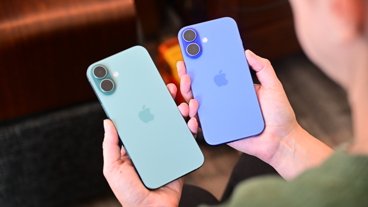Apple's agreements with IBM and Nokia were disclosed in a court filing in Apple's ongoing legal battle with Samsung. Though the details were redacted from the documents made public, The Verge got a glimpse at the original, uncensored court filing which reveals the licensing deals.
Nokia and IBM have paid Apple for the use of U.S. Patent No. 7,469,381, entitled "List Scrolling and Document Translation, Scaling, and Rotation on a Touch-Screen Display." It covers the scrolling behavior in iOS, in which a background texture is displayed when a user scrolls beyond the end of a website or document.
The same patent has been cited by Apple in its attempts to have Samsung's devices barred from sale. Last week, a California judge denied Apple's request to have the sale of certain Samsung Galaxy products stopped.
But Apple reportedly offered a license on the '381 patent to Samsung in November of 2010 as part of settlement negotiations between the two companies. However, unlike IBM and Nokia, Samsung did not license the patent.
Author and legal expert Nilay Patel noted that the fact that Apple has licensed the '381 patent is significant, because the company believes it's a strong patent from its iPhone-related portfolio. Specifically, Samsung, Nokia and HTC have all been sued over the '381 patent.
"Offering up a distinctive software feature covered by a strong patent indicates a level of willingness to negotiate that we simply haven't heard from Apple in the past — it's a far cry from Steve Jobs telling his biographer that he was willing to go "thermonuclear war" on Google and Android OEMs for infringing Apple's patents," Patel wrote.
Walter Isaacson's biography of Jobs, released in October, reveals that the Apple co-founder vowed to "destroy" Google Android, which he considered to be a "stolen product." It also said that Jobs told former Google CEO Eric Schmidt he didn't want Google's money, and that he wasn't interested in settling and reaching a licensing agreement.
"I don't want your money," Jobs reportedly said to Schmidt. "If you offer me $5 billion, I don't want it. I've got plenty of money. I want you to stop using our ideas in Android, that's all I want.
 Sam Oliver
Sam Oliver






-m.jpg)






 Christine McKee
Christine McKee
 Charles Martin
Charles Martin
 Mike Wuerthele
Mike Wuerthele
 Marko Zivkovic
Marko Zivkovic
 Malcolm Owen
Malcolm Owen


 William Gallagher
William Gallagher


-m.jpg)






24 Comments
Licensing is LAZY!
Make better technology and stop using others' smelly socks.
Perhaps Apple knows that these legal fights will take them nowhere and better stop to cut a deal now; basically just let it go. There are better things to do.
Apple did buried a hatchet with IBM and Microsoft. Time to do the same with mobile phone makers?
I am not really sure I follow the logic of this article! SJ was alive in November 2010 so the offering to Samsung has nothing to do with the "far cry" mentioned in this post.
Perhaps Apple knows that these legal fights will take them nowhere and better stop to cut a deal now; basically just let it go. There are better things to do.
Apple did buried a hatchet with IBM and Microsoft. Time to do the same with mobile phone makers?
I think you may have that backwards - it sound more like Samsung should get with the program and stop wasting time and money and reach an agreement similar to what others have done.
Nokia and IBM have paid Apple for the use of U.S. Patent No. 7,469,381, entitled "List Scrolling and Document Translation, Scaling, and Rotation on a Touch-Screen Display." It covers the scrolling behavior in iOS, in which a background texture is displayed when a user scrolls beyond the end of a website or document. . .
Rather than paying money for the patent use, it's been assumed Nokia got the rights to it in the settlement Apple made with them a few months ago. If you remember at the time, Apple stated they had given Nokia a license to some, but not all of the patents that make the iphone unique. As for IBM, IIRC there was a package of patents that Apple needed from them. They may have made a licensing trade with them too since I can find any indications that any money flowed from either Nokia or IBM into Apple coffers.
Not that this matters all that much, since it simply confirms the belief that Apple did license some unique iPhone patents to Nokia to make the suit go away. Why Samsung/Apple negotiations didn't have the same result is anyone's guess. It would have benefited both sides for there to have been a settlement IMO.